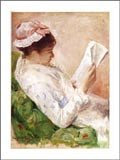 Hugo & Rose by Bridget Foley
Hugo & Rose by Bridget FoleyMy rating: 4 of 5 stars
High-concept books require readers to buy into the premise - in this case, that a woman, Rose, has been dreaming about a fantastic island and playmate, Hugo, since she was recovering from an accident at age six. Every.Single.Night. The island is a whimsical affair, with sparkling pink sands, weird foes to be vanquished, and landmarks such as Castle City and the Green Lagoon. Hugo leads their adventures aboard the Plank Orb, and flying above Spider Chasm.
Rose marries Josh, a surgeon, and has three little children. Although she continues to have the dreams, she ages, as we all do, and is vaguely dissatisfied with what she calls her "sweatpants years." On the island, in her dreams, she is still beautiful and fit, as is Hugo, even though both have aged in the dreams. "Of what consequences are the dreams of housewives?" she wonders, retreating into sleep and feeling alienated from the other mothers.
Her husband and children have participated vicariously in the dream-world via the stories they have adopted as a shared mythology. They look forward to their bedtime play with the Tickle Monster, and they build a LEGO replica of the island.
Of course, the impossible becomes possible one day when she drives a carload of hungry, grumpy children to a less-travelled fast food restaurant, Orange Tastee. The cashier, against all real-world logic, is Hugo: older and less beautiful, like Rose, but unmistakable.
She is shaken - who wouldn't be? - and she begins to stalk him when her children are in school. When she decides to show herself, he recognizes her but panics. Soon, the dreams they share begin to change...
The concept is intricate, and beautifully limned. The lines between good guys and threatening entities, waking and dreaming, shared history and unique childhood traumas, are honored, even when circumstances begin to deteriorate. Many of the recurrent themes - imperiled children, the perceived shallowness of caregivers - resonate deeply. Who hasn't wished for an imaginary world and an agreeable companion?
My rating is really 3.5 stars, shading toward a generous 4. One star is subtracted because the writing sometimes slips into cumbersome, tell-don't-show pronouncements ("it played into their innate desires for self-reliance") that are annoying and spell-breaking, especially after a well-written passage of show-don't-tell. Another half-star would be subtracted because Rose's husband is just too, too patient. But it's a good and diverting read, and a fine first novel.
I received an ARC of this book from NetGalley in exchange for a fair review.
View all my reviews















